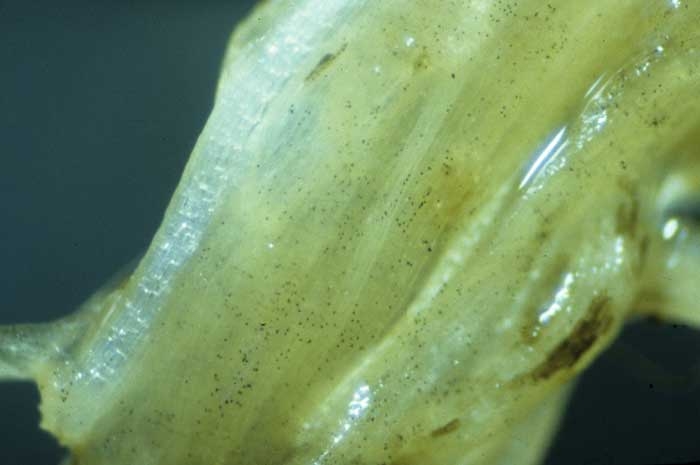Indoor Strawberries: Top 3 Plant Pathogens to Watch For While controlled environments offer many advantages for indoor strawberries, they also create the perfect conditions for certain plant pathogens to thrive. In 2024, agricultural experts are drawing attention to three major pathogens impacting strawberry crops: Botrytis cinerea (Gray Mold), Neopestalotiopsis spp., and Phytophthora spp. To help […]
Pathogen Profile: Neopestalotiopsis Introduction Neopestalotiopsis is a significant fungal pathogen threatening strawberry growers globally, including indoor cultivators. This aggressive fungus damages various plant parts and has evolved to become more virulent, posing serious risks to production. Recent reports highlight its presence in indoor growers in Quebec and the Northeastern United States. Neopestalotiopsis is a genus […]
Pseudomonas cichorii Introduction Bacterial leaf blight caused by Pseudomonas cichorii is a significant disease affecting many crops and ornamental plants. Here’s an overview of this pathogen and its impact. P. cichorii has a broad host range and has been reported in numerous countries: Ornamental Plants: Chrysanthemum, Gerbera, Monstera adansonii, Calceolaria hybrida (pocketbook plant), aglaonema (Aglaonema […]
Understanding Phytophthora abietivora There are plenty of threats to plants on our planet, ranging from pests to diseases. Some of these threats can affect plants inside and outside the greenhouse. Among these threats is Phytophthora abietivora, a fungal pathogen that targets fir trees and poses potential risks to greenhouse crops. Knowing about this pathogen, its […]
Bremia lactucae Introduction Bremia lactucae causes lettuce downy mildew for both indoor and outdoor lettuce. It is a significant pathogen in cooler environments like late-fall seasons and heated winter greenhouses. This plant pathogen is an oomycete, and symptoms of the disease are similar to late blight. However, the disease may appear as white fungal growth […]
Erwinia tracheiphila Introduction Erwinia tracheiphila is a bacterial pathogen that causes bacterial wilt, a devastating disease affecting cucurbits such as cucumbers, muskmelons, and, to a lesser extent, squash and pumpkins. This disease does not affect watermelons. The economic impact of Erwinia tracheiphila is significant, particularly in the Midwestern and Northeastern United States, where it threatens […]
Pepino Mosaic Virus (PepMV) Introduction Pepino Mosaic Virus (PepMV) is a highly infectious pathogen that primarily affects solanaceous plants, including tomatoes, potatoes, and eggplants [1][2][3]. It was first detected on pepino plants in Peru in 1974 and has since spread to several countries, causing significant problems in the cultivation of greenhouse tomatoes [1][3]. The virus […]
Banner Image by Bruce Watt, University of Maine, Bugwood.org. https://www.invasive.org/browse/detail.cfm?imgnum=5507942& Fusarium oxysporum f. sp. capsici Introduction Fusarium oxysporum f. sp. capsici is a soil-borne fungal pathogen that poses a significant threat to pepper crops. This pathogen is responsible for Fusarium wilt, a devastating disease that can lead to substantial yield losses. The economic impact of […]
Olpidium brassicae Introduction Olpidium brassicae is a common fungal parasite that infects the epidermal cells of plant roots, particularly those in the Brassicaceae family and tobacco plants [1]. It is commonly known as seedling blight of tobacco or seedling disease of cabbage. This pathogen has a significant economic impact on agriculture, as it can reduce […]
Olpidium virulentus Introduction Olpidium virulentus is a parasitic fungus that infects plant roots, including leafy greens grown hydroponically. The pathogen can transmit two serious viruses: Lettuce big-vein associated virus (LBVaV) and Mirafiori Lettuce Big Vein Virus (MLBBV), causing a decrease in overall yield. Olpidium virulentus does not cause significant plant diseases but is a vector for viruses […]












